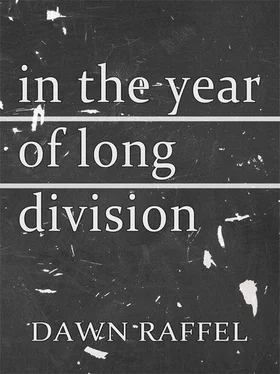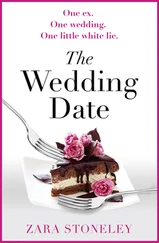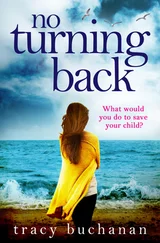“Why don’t you wear your gloves?” he said.
“No,” she said. “They’ll spoil.”
He righted a shingle, grunted.
“Some deal,” she said. “Some job you went and got us.” She was not given to working in this dangerous manner with her hands. She was not keen, she said, of hired employment.
She predicted splinters, and mutinous behavior.
The ladder shuddered.
“Rae?” he said. “We won’t die broke. Look in that window.”
Daylight was slipping.
“Yes?” she said.
“No one can see us,” he said.
“What is this color trim?” she said, regarding a grander residence some small ways north. “What do you call it?”
“Red?” he said. “Rust?” he said. “Ruby glow?”
“Too late,” she said. She was swinging the hammer with feminine abandon. Something squawked. She strangled it. She stuffed her coat, her dress, herself. “Pick out what you want,” she said.
“What’s this?” he said, in rosy, dying light.
“Glass,” she said. “A window.”
“Not now,” he said. “Not anymore.”
A woman screamed. Shards glittered like the wintry landscape. Down went the sun. To judge by the sound, the woman was probably heavily running. “Thief,” she screamed.
“Vern,” Rae said.
“Brick?” he said.
“Hurry up,” Rae said. “I think that woman wants her nails back.”
“Stop,” the woman screamed.
“Tessie,” a man yelled, “give us some peace.”
The woman screamed, “Murder! Help,” she included.
Lights snapped into life.
Rae dropped the hammer. Raced.
The voice of another woman rose: “Police!” she cried. “Police! Doctor! Officer!”
Someone cried, “Tessie! Bill! Lucette!”
There were men and there were women in the darkening road, and feathers and bed things, shards, shoes, gloves, rats, lint, tar, fleece, scraps, twigs, and indescribable splinters of trim.
“Rae?”
“What?”
“Run,” he said.
“I am,” she said.
A violent whistle.
Black. Cold black. Combustible black, ruinous foot-felt, lumpy black. Stars were in abundance. The screaming was fading. He and she were moving combustibly, blackly. “What am I touching?” she said.
“Guess,” he said.
She screamed.
“I heard that,” he said.
“Coal,” he said. “Likely.”
“I never liked a train,” she said. “Did you?”
Nighttime pounded by. He seemed to try to stand. He slumped. Whatever was beneath them both was shifting. Surely, there were smells — the smell of a thing like coal, like grain, like carbon, the smell of a lake or body of water, out of view, unseeable, or something like the liquid night itself. Night birds were shrilling. Goatsuckers, she called them. Nightjars. Drops softly fell.
“Did I?” he said.
“Did you what?” she said.
“Like a train,” he said.
She offered him something. “Eat,” she said.
A warming filled his hand. He held it.
“Vern?” she said.
“What now?” he said.
“Do you think there’s a heaven?”
Under his nose, he held it still.
“Ask me what I think,” she said.
“Do you want to hear something true?” he said.
“Don’t know,” she said. “Depends.” She crossed her arms. Her knees she brought up chestwise.
His jaw was slowly working. “I never liked to travel,” he said.
“That so?”
“It is.”
“Myself, I would say it depends,” she said.
“Would you?”
“I would.”
“What on?”
“How far,” she said.
“To where?” he said.
She expelled her breath.
“Bad answer,” he said.
“What am I eating?” he said.
“Something or other,” she said.
“Which?” he said.
“I’m stiff as a board,” she said. “I’m stiff as a clapboard house’s boards.”
“Sweet,” he said. He wrapped her in his jacket despite she wore a coat. He whistled — a shallow, languid sound.
“Is it morning?” she said.
“No,” he said.
“Now?” she said.
“Yes,” he said.
“My gloves,” she said, patting. “Look. Are you looking? I think I’ve gone and lost them.”
He had finished eating.
“Don’t sweat it,” he said.
THE woman had a stove, stove-in, in the middle of the ramble of her yard. She had pumps for gas, for air, with icy nozzles stiffly hanged, drinks for sale so cold, the glass was crazed. She had tricky chairs, a pillow sprouting feathers. She had wrenches and marbles, selected appliances, haywire toasters, fryers furred with some contagion, claw-foot tubs, assorted seamy clothes. She had no arms. None at all. Rooted in her chin, she had what looked to be whiskers.
“Ma’am,” he said, “good day.”
“It is,” the woman said.
“People call me Jordan,” he said. “Call me Jordan.”
“Do they?” she said.
“Like the river,” he said.
“Rae,” Rae said.
“Mrs. Hatch,” the woman said. “Like Mrs. Hatch.”
“Missus,” Rae said. “Nice place.”
“Onliest shopping around,” Mrs. Hatch said.
“Onliest anything else,” Rae said.
The land seemed placid, embalmed. Flat-out and trackless.
“Jordan,” Rae said, “ask her.”
“What day is it?” he said.
The eyes went dark.
“Missus?” he said.
“Jack,” she said. “You think the world was made for you to come and rule it, don’t you?”
“Sunday?” he said.
“Don’t know as I know,” she said. “Don’t know as it rightly matters.”
“Guess not,” he said.
“Thursday or Tuesday or some such,” she said.
“What about Wednesday?”
“Either, or,” she said.
“What all is this?” Rae said.
“Not Sunday,” Mrs. Hatch said. “I’m working up a powerful sweat.”
There were barrels full of dresses — women’s and children’s, dolls’, too. In one of the barrels, a small cat rolled. Cat-eyed. Lifeless. Stockings with tassles. A shoe.
“I might have been wanting gloves,” Rae said.
“Where do you keep the cash?” he said.
“One at a time,” said Mrs. Hatch. “Don’t know as I carry gloves.”
“So where is the till?” he said.
“Jack,” she said.
“I told you once,” he said. “Jordan. Like the river.”
“Maybe a ribbon,” she said to Rae. “Or maybe a frilly nightie?”
“Move,” he said.
Her sleeves moved, drifty and weightless. The weather seemed entirely given to change.
“Who is he to you?” Mrs. Hatch asked.
“Just do what he says,” Rae said. She was fingering man-size shirts. Dressylike. Over the pockets, names of men were roundly sewn, silky and cursive.
“Move,” he said, louder.
Mrs. Hatch yawned. “Is this some kind of stickup?” she said.
“Yes, ma’am,” he said.
“Well, where is your weapon at?” she said.
“Don’t know as I need it,” he said. “What’s to stop us from robbing you blind?”
“Him,” she said.
“Who?” he said.
“Our Lord,” she said.
“Whose?” he said. “Jesus’?”
“I’ve got me a knife,” Rae said.
“I warn you,” Mrs. Hatch said. “I aim now to pray.”
“How?” he said.
“Easy — for your soul,” she said.
“How can you,” he said, “without you have arms?”
“Vern,” Rae said.
“Damn it, Rae,” he said. “Don’t let her know.”
Wind whipped up. A dark cat snapped across the yard. Leaves blew sideways from nowhere, wrongly formed.
“Don’t think I don’t know,” Mrs. Hatch said. “I know you. I knowed you the minute I first laid eyes.”
Bibs lifted, defiled, into the air.
Читать дальше












